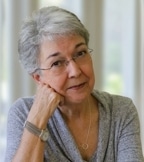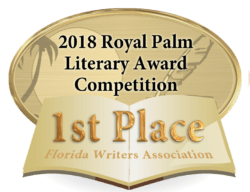
Memoirist Susie Baxter wanted to save the memories of her family and childhood growing up in rural Florida for future generations, but wasn’t sure how. After taking a Life History class, she quickly discovered her calling and began penning her memoirs. At first, she believed her tales of growing up to be fairly ordinary, until members of her critique group convinced her otherwise. Further proof? Susie won First Place for Published Memoir in the 2018 Royal Palm Literary Awards and was the First Runner Up for Published Book of the Year. Susie discusses the craft of memoir and how she uses events in her life to create compelling stories for readers in this week’s showcase.
How It All Began: With Family
During my career as a developmental and acquisitions editor for a medical publishing house in St. Louis for more than a decade, I wrote book proposals and commissioned renowned physicians to author them. I never intended to be a writer myself. But when my beloved grandmother passed away, I penned a few precious memories of her. While writing, I had numerous questions I wished I could ask her. It was too late, of course. She was gone. So when my mother was later diagnosed with colon cancer, the bad news propelled me to look seriously at recording a family history. I enrolled in a Life History class at the local library taught by Dr. Hilda K. Ross, and my journey was underway.
 The Winning Entry, Pumping Sunshine: A Memoir of My Rural Childhood
The Winning Entry, Pumping Sunshine: A Memoir of My Rural Childhood
Logline: Young Susanette, who grows up in a rural Florida home with no indoor plumbing, wants more than anything to be like her older sisters, who don’t have her bad habit.
My goal was to preserve a piece of history for future generations. My rural southern childhood—growing up in a cracker house on a dirt-poor farm near the Suwannee River—contrasts sharply with that of my grandchildren, who live in brightly lit metropolitan areas. I wanted them to get a taste of what country life was like in the mid-twentieth century when power lines did not extend to half of rural homes.
Since I’m no celebrity and I considered my childhood to be quite ordinary, I did not expect a wide readership, but I did want the material to be interesting. Otherwise, even my grandchildren wouldn’t read it. So I joined a writers group (a “critique pod” within the Writers Alliance of Gainesville) to obtain feedback, and hopefully, improve my writing.
I’m sure my first stories were pathetic. But to my surprise, fellow pod mates said my life was anything but ordinary. To them, ordinary was growing up with amenities unknown to me as a child: a telephone, a television set, electric lights, and indoor plumbing. As they read my stories—of my uncle building us an outhouse, of Mama washing our dirty clothes in an iron kettle in the back yard, of enjoying polecat on cane-grinding day, of cutting up the fat for cracklins on hog-killing day, and of the Suwannee River flood of 1948—they seemed genuinely interested. When the book was finally complete—after revision after revision over a ten-year period—they encouraged me to enter the published book in the RPLA competition. I am forever indebted to my pod mates.
Read an excerpt of Pumping Sunshine here
Two Truths and a Lie, Writer’s Edition
Outline before you start.
Writers should join a writing group.
Write with your heart; edit with your head.
The lie? Outline before you start. I think this is false when it comes to writing a memoir. I suggest that memoirists begin by writing about events and people important in their lives without worrying about how everything will fit together or how the story will end. One’s life can be sliced and diced in many different ways. The first stories I wrote dealt with traumatic events in my life, and writing about them was cathartic. I didn’t figure out the thread that would run throughout my book and what stories I would keep in the book until I had completed about fifty chapters. Only then did I create a semi-outline, a table of contents with topic subheads. A few of the cut chapters (e.g., Poisoning Tobacco Before Daylight with DDT) will go into my next book.
Writers really should join a writing group. It’s absolutely true for me. While a writer should not take every little piece of advice that is offered by others—it’s the author’s voice and story, after all—if two or more readers make the same suggestion, it’s probably worthy of consideration. You should also write with your heart and edit with your head. A first attempt should be like a draft of air moving through an open window. We should just let it flow and see where it leads. Save the editing for later. That’s when you decide what to keep, what to toss.
Other Works by Susie
My first book, C.G. & Ethel: A Family History, focuses on the hardscrabble lives of my parents. At age seven, my father lost his dad, which left his mother, who had only a seventh grade education, to raise five children. His mother tried to support her family by farming, “taking in” sewing, and serving as a live-in housekeeper, but when she became ill, my father and three of his surviving siblings ended up in an orphanage. When he and my mother married, my father said, “We didn’t have a pot to pee in. So we bought one.” Through hard work, frugality, and perseverance they achieved the American dream of owning their own home, as well as a large tract of land near the Suwannee River.
My second book, Write Your Memoir: One Story at a Time, seeks to inspire others to write their memoirs. It grew out of a class I teach on memoir writing at Santa Fe College in Gainesville and includes tips, exercises, and quotes to motivate and inspire. The Tim Tebow quote that I included was probably meant for his teammates, but it applies just as well to writers: “Hard work beats talent when talent doesn’t work hard.”
Coming Next From This Author
I am working on a memoir of my teen years. It picks up where Pumping Sunshine left off. As a thirteen-year-old in the 1950s, what I wanted most in the world was a boyfriend. All my girlfriends had boyfriends. I hoped to marry and live happily ever after, but unsightly warts dotted my hands, arm, and legs—plus, I had buckteeth. What boy would ever want to date an ugly girl like me? Much less marry one.
Connect with Susie
I serve as Creative Nonfiction Editor of Bacopa Literary Review, WAG’s print journal and can be found on their website: Writers Alliance of Gainesville (WAG) Website. I also have my own website susiehbaxter.com as well as an Amazon author page.
More About RPLA
The Royal Palm Literary Awards competition is a service of the Florida Writers Association established to recognize excellence in members’ published and unpublished works while providing objective and constructive written assessments for all entrants. Judges include literary agents, publishers, film producers, current or retired professors, teachers, librarians, editors, bestselling and award-winning authors, and journalists from across the nation. Entries are scored against the criteria set by RPLA using rubrics tailored to each genre. Winners are announced at the annual FWA conference during the RPLA awards banquet. To learn more about RPLA, click here for the guidelines.

First Runner Up Published Book of the Year
